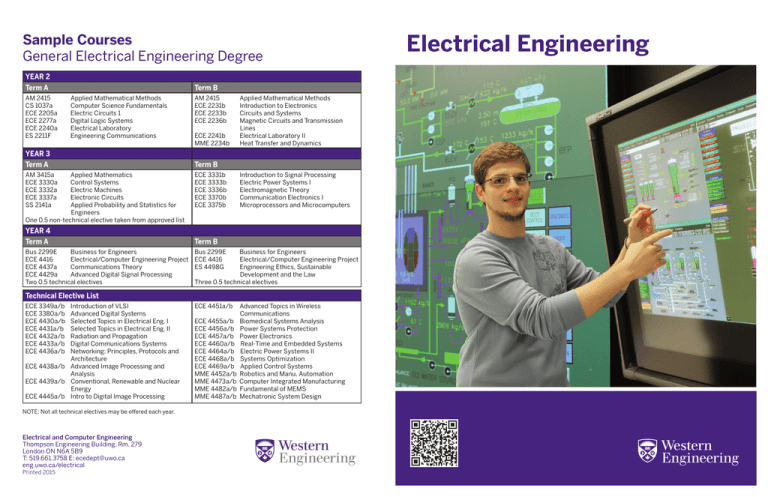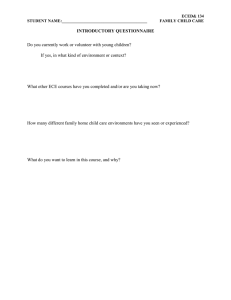Electrical Engineering
advertisement

Sample Courses General Electrical Engineering Degree YEAR 2 Term A AM 2415 CS 1037a ECE 2205a ECE 2277a ECE 2240a ES 2211F Term B Applied Mathematical Methods Computer Science Fundamentals Electric Circuits 1 Digital Logic Systems Electrical Laboratory Engineering Communications AM 2415 ECE 2231b ECE 2233b ECE 2236b ECE 2241b MME 2234b YEAR 3 Term A Term B AM 3415a ECE 3330a ECE 3332a ECE 3337a SS 2141a ECE 3331b ECE 3333b ECE 3336b ECE 3370b ECE 3375b YEAR 4 Term A Term B Applied Mathematics Control Systems Electric Machines Electronic Circuits Applied Probability and Statistics for Engineers One 0.5 non-technical elective taken from approved list Bus 2299E Business for Engineers ECE 4416 Electrical/Computer Engineering Project ECE 4437a Communications Theory ECE 4429a Advanced Digital Signal Processing Two 0.5 technical electives Applied Mathematical Methods Introduction to Electronics Circuits and Systems Magnetic Circuits and Transmission Lines Electrical Laboratory II Heat Transfer and Dynamics Introduction to Signal Processing Electric Power Systems I Electromagnetic Theory Communication Electronics I Microprocessors and Microcomputers Bus 2299E ECE 4416 ES 4498G Business for Engineers Electrical/Computer Engineering Project Engineering Ethics, Sustainable Development and the Law Three 0.5 technical electives Technical Elective List ECE 3349a/b ECE 3380a/b ECE 4430a/b ECE 4431a/b ECE 4432a/b ECE 4433a/b ECE 4436a/b Introduction of VLSI Advanced Digital Systems Selected Topics in Electrical Eng. I Selected Topics in Electrical Eng. II Radiation and Propagation Digital Communications Systems Networking: Principles, Protocols and Architecture ECE 4438a/b Advanced Image Processing and Analysis ECE 4439a/b Conventional, Renewable and Nuclear Energy ECE 4445a/b Intro to Digital Image Processing NOTE: Not all technical electives may be offered each year. Electrical and Computer Engineering Thompson Engineering Building, Rm. 279 London ON N6A 5B9 T: 519.661.3758 E: ecedept@uwo.ca eng.uwo.ca/electrical Printed 2015 ECE 4451a/b Advanced Topics in Wireless Communications ECE 4455a/b Biomedical Systems Analysis ECE 4456a/b Power Systems Protection ECE 4457a/b Power Electronics ECE 4460a/b Real-Time and Embedded Systems ECE 4464a/b Electric Power Systems II ECE 4468a/b Systems Optimization ECE 4469a/b Applied Control Systems MME 4452a/b Robotics and Manu. Automation MME 4473a/b Computer Integrated Manufacturing MME 4482a/b Fundamental of MEMS MME 4487a/b Mechatronic System Design Electrical Engineering What is Electrical Engineering? Individualize Your Electrical Engineering Degree Electrical engineering generally deals with the study and application of electricity, electronics, and electromagnetism. It covers a wide range of subfields including electronics, digital computers, power engineering, telecommunications, control systems, and signal processing. Dual Degrees Western’s Electrical Engineering Program A dual degree allows you to gain a competitive edge towards a rewarding career. You will have the engineering skills and knowledge to become a successful problem solver, prepared to address and find solutions to current and future problems around the world in a traditional engineering career or a profession of your choice. We offer the following dual degrees with our Electrical Engineering program: Electrical Engineering and Business Common First Year All first-year students complete a common first year. Courses include: Introductory Engineering Design and Innovation Studio, Applied Mathematics - Calculus, Chemistry, Applied Mathematics - Linear Algebra, Physics, Computer Programming Fundamentals, Properties of Materials, and Statics. After two years in Engineering, you can apply to the Ivey Business School. If admitted to Ivey, you will take a combination of HBA courses and Electrical Engineering courses for the next three years. At the end of five years, you will graduate with both BESc and HBA degrees. Electrical Engineering and Law Wireless Communication Option Wireless Communication is one of the most dynamic areas of industrial development and research. Our program allows students to explore the operation and design of communication systems. Courses in theory and design of Communications Systems, Antennas, Data Networks and Digital Signal Processing form the core of this option. After three years in Engineering, you can apply to Western Law after writing the LSAT examinations. For the next three years, you will take a combination of Law courses and Electrical Engineering courses. At the end of six years, you will graduate with both BESc and LLB degrees. Dual Degrees with Other Faculties Power Systems Engineering Option The world is looking to develop sustainable, environmentally friendly and diversified sources of electrical energy. There is also a significant demand in the power generation and distribution industry for renewal and expansion of technical personnel. This option offers students a solid background in design and the operation of conventional power systems, as well as insight into modern and alternative sources of electric power generation. Biomedical Signals and Systems Option As society continues to age there is a higher demand for intensive upgrades and modernization of medical equipment, resulting in a greater need for engineers specializing in design, manufacturing and servicing of such devices. This option offers students a solid background in the fields of signal processing, imaging and biomedical systems. Career Opportunities Sample CareersTypes of Employment Sectors • • • • • Instrumentation and Control Engineer Electrical Engineer Avionics Engineer Communications Engineer Electronics Test Engineer • • • • • • • Aerospace Bioengineering Consumer Electronics Education and Research Energy and Electric Power Manufacturing Telecommunications We also offer more than 50 other dual degrees involving a major module in faculties such as: Science, Music, Social Science or Arts & Humanities. Internship and Co-op Programs Our optional Internship and Summer Engineering Co-op Program provides you with opportunities to gain practical experience while earning a salary. The 12 to 16-month internship is available following your third year of study. Summer co-ops provide technical work experience during the summer months (May-August). You can complete a co-op every year or choose to complete just one during your time at Western. Accelerated Master’s Program This program is offered to third-year Western Engineering students. Applicants must have an average grade of 80 per cent or higher (based on their second and third-year courses). The Accelerated Master’s Program provides you with the opportunity to receive a research master’s degree within one year of receiving your bachelor’s degree.
